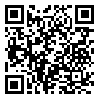BibTeX | RIS | EndNote | Medlars | ProCite | Reference Manager | RefWorks
Send citation to:
URL: http://yafte.lums.ac.ir/article-1-150-en.html
Background: The progress of economic and health conditions of countries,in one hand has decreased paediatrics mortality and morbidity of infectious diseases and enviromental events and on the other hand, it has led to increase the role of herediatric diseases at paediatrics mortality and disabilities.The offspring of consanguinous marriages are at great risk of certain genetic disorders. The rate of congenital malformation in consanguinous marriage was reported to be 6-8% in each delivery that is about twice more than in general population. one of the important factors to consanguineous marriage is the attitudes of people towards this type of marriage. The attitude of high school students as future parents has an important role on consanguineous marriages. This survy was conducted to detect attituds of high school students towards consanguineous marriage and its effect on offspring health in Khorramabad in 2005.
Materials and Methods: This cross-sectinol study was carried out on 1110 high school students selected through cluster randomised sampling. Data gathering tool was a questionnaire consisted of tow compenentes: demographic information, and questions of attituds towards effects of consanguinous marriage on offspring health. Data were analysed by SPSS ver11.
Results: Results indicated that in 35.9% of the students’ parents had consanguinous marriage. 81.4% of the students had netural attituds towards the possible adverse effects of consanguineous marriage on offspring health. A significant relation was observed between attitudes towards the possible adverse effects of consanguineous marriage on offspring health and sex (p=0.037), course of study (p=0.004),mothers educational level (p=0.024),fathers educationl level (p=0.027), parents consanguinity (p=0.002) and sister or brother consanguineous marriage(p=0.023 ).
Conclusion: Results indicated that high school students had netural attitud towards effects of consanguinous marriage on offspring health. They may have consanguineous marriage in future even without genetic consulation. Based on this results exact educational programs are necessary to increase awareness and change attituds of pupiles about the possible adverse effects of consanguineous marriage on offespring health. Efforts to increase the knowledge of adolescents about consanguineous mariage should be especially directed towards females with parents who have a lower level of education, as well as femeles with parents who had consanguineous marriage.
Received: 2010/02/8 | Accepted: 2021/10/13 | Published: 2009/04/15
| Rights and permissions | |
 |
This work is licensed under a Creative Commons Attribution-NonCommercial 4.0 International License. |





